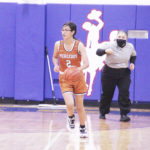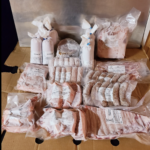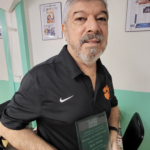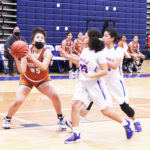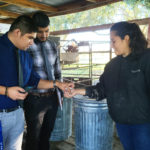“Barefoot boy with cheek of tan…

“Barefoot boy with cheek of tan…
I was born in Mercedes. Parents both were born deep in Mexico, mom from Guanajuato, Guanajuato, dad from San Juan de mezquital, Durango. The land between the two rivers The Trinity and the Rio Grande was neither Mexico nor the U.S. It was both.
As a child living in South Texas, south of the King’s ranch, we knew no “Anglos,” though they lived across the railroad tracks, a classic tale of two cities. I went to school known as the “Mexican school,” North Ward Elementary – the very first reference to politics in my life.
The barrio was on First Street, caliche and gravel, dust and poverty our permanent neighbors. There was a vegetable-packing plant across the street. When it rained we kids played under the rain gutters to cool ourselves. We bathed in a number 2 bathtub, no showers, except those we improvised: water from a water tank which released some water by pulling a string, these during our migrant days.
This whole land had been developed from mesquite and shrub country, “el desenraiz” de-rooting, yanking up trees, clearing the brush land for irrigation-farming in the early 1900’s. People were fleeing a war-torn country, Mexico , from its civil war, the Mexican Revolution of 1910. My maternal grandfather, his wife and first child, my mother , Manuela Josefina Gutierrez, preceded subsequent immigrations for the same reason: to earn a decent living and raise a family.
They crossed the river in a chalan, a crude ferry to Hidalgo; from there to Lyford and them Mercedes. My grandfather worked for the hotel where the First Bank is now located. There was a “cuartel,” a headquarters for the U.S. Army sent to put a stop to the ‘bandit raids.’
Segregation was a way of life. The Mexican side on the north side with crude plumbing, dirt and caliche streets, the south side clean, well-kept, paved streets, everything “modern.”
We had our cantinas, a church -there was one for gringos too – and our free-standing Mexican world.
The Valley was a “winter garden.” There were several vegetable -packaging plants just north of the railroad tracks that connected Mercedes to the other towns and cities in the Valley. Those plants continued to attract mexicanos from south of the border, the first stop to the interior and the Midwest of the U.S. , other more lucrative markets, higher paying jobs like the steel mills of Chicago and auto industry of Pontiac and Detroit , Michigan
The barrio was our Camelot. It was full of urchins my age, other kids with vivid imaginations like mine. The plants used ice to prolong the life of the vegetables heading north by railroad. The ice would melt creating small streams or swamps under the physical vegetable-packaging plants. These waters were full of tadpoles, fire ants and horny toads – interesting subjects to lose oneself as a kid. That was our water world, our air-conditioned playground, out of the hot Texas sun, cool from the melted ice.
Occasionally, there were open water hydrants. Even though the river is a mere less than 5 miles from Mercedes – Padre Island and the Gulf of Mexico nearly 50 miles away -the swimming pools closed to Mexicans and Mexican Americans, the water under the plant and fire hydrants satisfied the lure of the ancient desire to be near the water for us kids.
Even though I was trained to be an aeromedical specialist for the hospitals when I left the nest in 1955, the U.S. Air Force was my introduction to management and administrationI completed my 4-year tour of duty and went to Washington D.C. to study at Georgetown University, a Jesuit university founded in 1789. George Washington was the keynote speaker at the first graduation ceremony.
I did not finish school at Georgetown, my life-long regret – and I have few regrets. I was working full-time on Capitol Hill and going to night school. I discovered women and parties. I met some pretty interesting fellows at Georgetown. Tony Anaya and I used to pool our pocket-change to buy sardine sandwiches, which we split – two near-broke individuals. Tony went on to finish law school and was elected State’s Attorney General and then Governor of New Mexico.
Luis Orsi was dating Lupita Carrillo Flores, the daughter of the Mexican ambassador to the United States. In the best Mexican tradition, we serenaded her. He went on to be Mexico’s representative to the International Monetary Bank in the U.S. Last I heard from him, he was a Federal Senator in Mexico D.F.
Last, but not least, there was Jim Thorndike. I met him in night school too. He was the clerk of the U.S. Senate, hardworking, humble and very accomplished. He learned secretarial skills when he was working for railroad executives. I guess it was inappropriate to have female secretaries then. The executives wives must have had a strong lobby.
I was working for the Nixon White House as an associate director of the President’s Cabinet Committee on Opportunities for the Spanish Speaking. From Washington D.C., I came home to run for the Texas State Senate. It was a three-way race. The Democrat, of course, won. I was a one-party state. The Raza Unida candidate made a difference in the outcome. I was running to talk about discrimination. I had no illusions of a possible victory at all. I received 43 per cent of the vote.
I had promised a friend who worked for the Governor of Illinois that if I lost, I would return to Chicago and help him set-up a consulting firm, the first Hispanic such firm in the Midwest. That is when I met my wife. After 10 month’s courtship, we got married. We moved to Texas. Our oldest, Ileana Marisela was born in Harlingen, followed by Jorge-Luis Armando.
I worked in a campaign and got the First Republican Governor of the State Texas elected in 104 years. He asked me to work in the Transition team, then as a senior staff assistant-counselor on the Governor’s cabinet. Cristela was almost born in the Steven F. Austin bed. We were at a dinner at he Governor’s mansion.
I will save that subject for another column. Suffice it to say that that was the most satisfactory professional job I had: a “some kind of ambassador,” the Austin Statesman newspaper dubbed me for my work with the governors of the Mexican states abutting the State of Texas and with the then President of Mexico Jose Lopez Portillo.
Sheila and I went on to have two more sons: Benjamin Martin, “Benjamin,” after the last tribe of Israel and “Martin” after Sheila’s dad Kenneth Martin Spitz. He changed it to Angel Xavier. Today, we find ourselves in a sea of sadness and grief. we are in the midst of putting him to rest. We believe it was a heart attack. We are waiting on the autopsy.
Life should be a simple, worship of God, love of family, making things right- justice and peace. Not so. Aging is clearly a factor, the good the bad and the ugly happens. “El golpe avisa,” my dad would say. Nothing prepares us from the hard knocks. Things get complicated. Children grow up and grow independent of the old folks. They have their own lives, make their own decisions. We are sidelined, free to brag about their achievements
But life is simple, if we turn it over to God.
Our strength and consolation now is in our spiritual readings and in our books. I love to write. I have started a book on immigration. It is my theory that Governor William P. Clements started the debate over immigration. He turned over our research to President Ronald Reagan which became the Simpson-Mazzoli bill, the last piece of legislation on immigration to date. Congress is more interested in using it as a political football that in resolving the issue. The current administration doesn’t know beans about this subject, to wit, the Vice President’s hands-in-the-air abandonment of the issue.
Amboy is a quiet place to live, but far from everything. I love the serenity of a small town. We are moving to be closer to the VA hospital. The housing market is pretty much closed. The right house is out there somewhere.
I love the four seasons. Winter is especially beautiful with the glitter of fresh snow on the ground on the trees and bushes. The mornings are especially beautiful. The sunrise is breathtaking. The snow is deep watering for the lawns and fields and future crops. Now that we have a grocery store (imagine praying for something that common), we are happier. We have everything we need even though its 50 miles away in every direction.
My prayer and meditations give me strength to finish the race….and you are probably praying for the end of this wordy column. But I am under orders “to profess and proclaim the goodness of the Lord” to a godless nation. Just saying.
A Dios.
G.G. Garcia
The prairieyaqui

